Community Grievances, Personal Responsibility, and DIY Protection: Frustrations and Solution-Seeking Among Marginalized Twitch Streamers
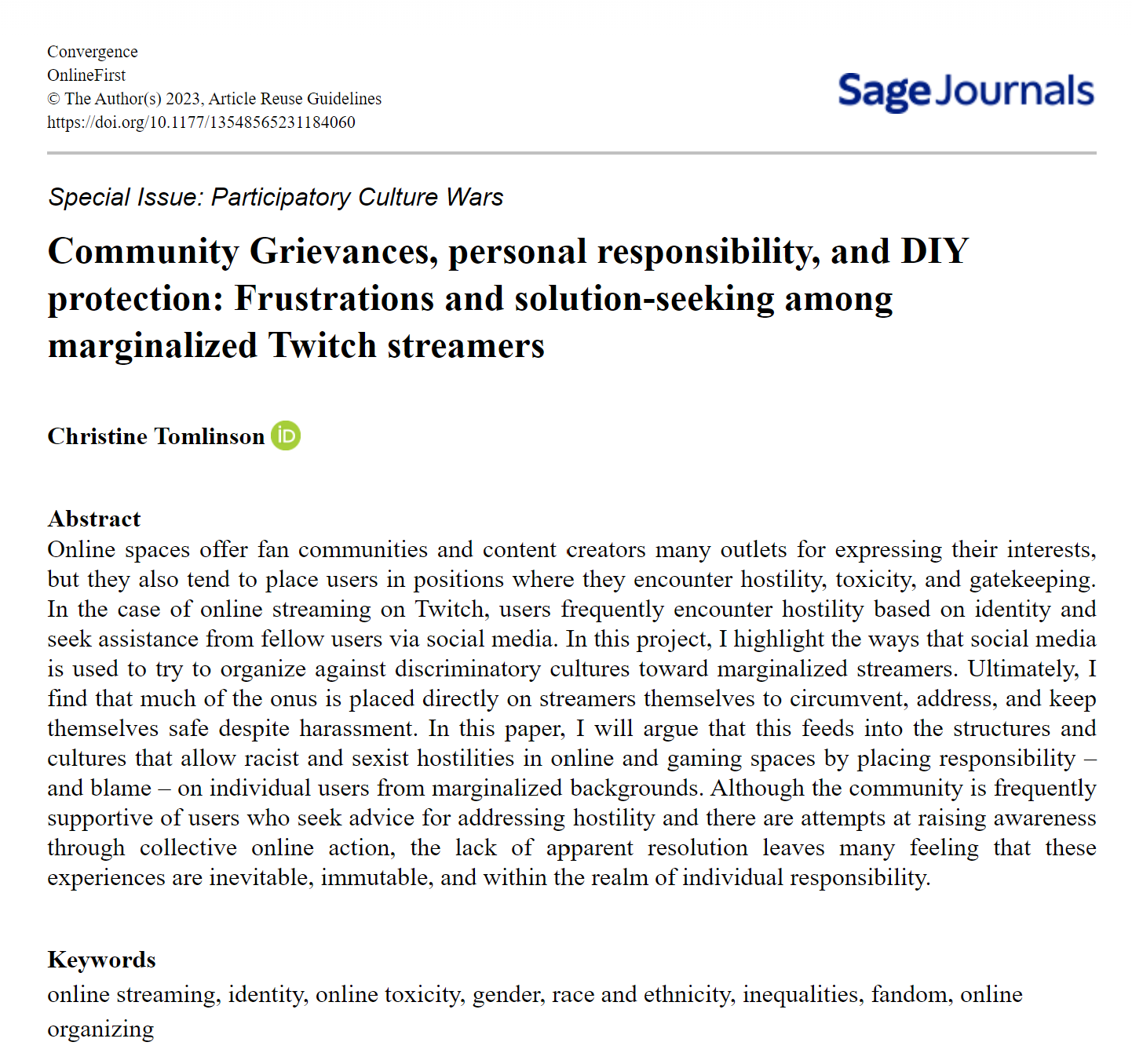
Online spaces offer fan communities and content creators many outlets for expressing their interests, but they also tend to place users in positions where they encounter hostility, toxicity, and gatekeeping. In the case of online streaming on Twitch, users frequently encounter hostility based on identity and seek assistance from fellow users via social media. In this project, I highlight the ways that social media is used to try to organize against discriminatory cultures toward marginalized streamers. Ultimately, I find that much of the onus is placed directly on streamers themselves to circumvent, address, and keep themselves safe despite harassment. In this paper, I will argue that this feeds into the structures and cultures that allow racist and sexist hostilities in online and gaming spaces by placing responsibility – and blame – on individual users from marginalized backgrounds. Although the community is frequently supportive of users who seek advice for addressing hostility and there are attempts at raising awareness through collective online action, the lack of apparent resolution leaves many feeling that these experiences are inevitable, immutable, and within the realm of individual responsibility.
Read in Convergence.
Gender, Stress, Satisfaction, and Persistence: The Complex State of Digital Games as Leisure
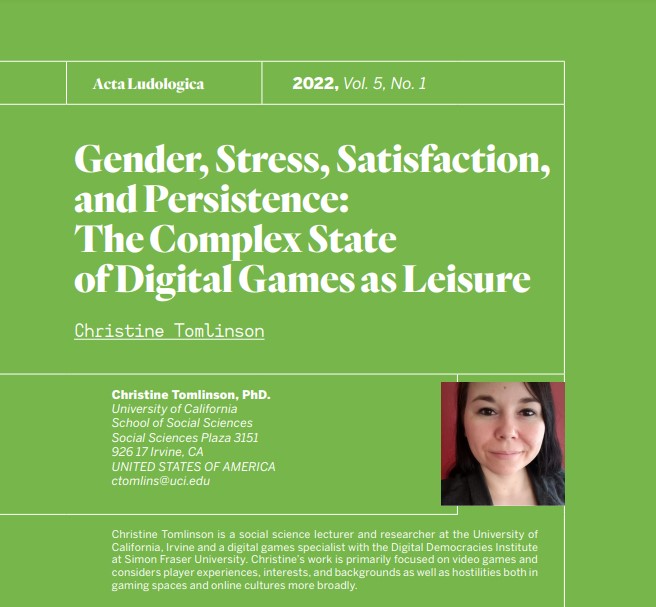
Digital games have long been investigated for links to negative influences, but they exert arange of impacts on players. A variety of factors can contribute to stressful experiences in play, including game content, player interactions, and gender. This project uses qualitative methods to better understand how players experience and perceive these stressors and why they persist despite them. There are a surprising number of ways that players’ experiences align in spite of gender. Players encounter stress with both design and social experiences, are inclined to “rage quit” if stressors are substantial enough, and are increasingly averse to toxic communities. However, there are also gender-specific experiences. Men are much more concerned with the skillsets of other players, while women worry about their own performance. Further, these experiences of stress complicate our understandings of distress and eustress, with players less motivated by stressors than they are by the anticipated future relief from distress.
Read in Acta Ludologica.
Beware Asian Servers: Racialized Perceptions of Cheating and Skill Among Video Game Players
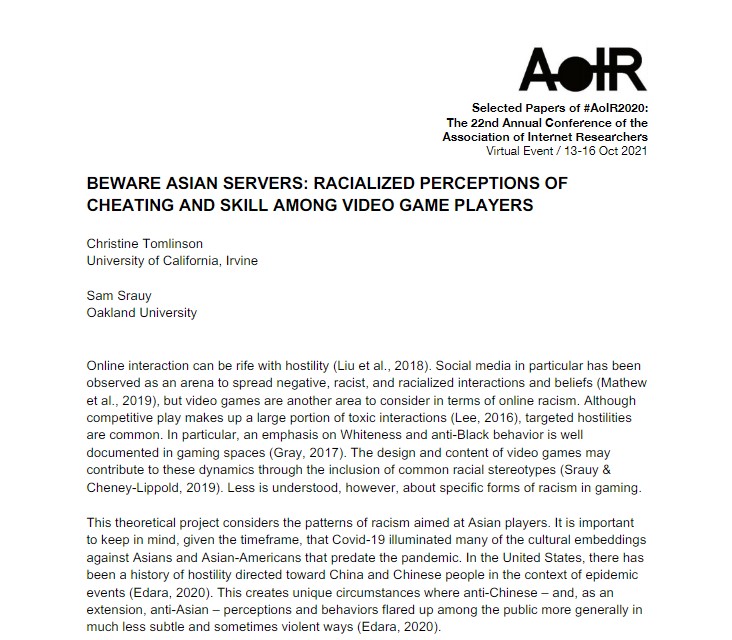
Authors: Christine Tomlinson and Sam Srauy
The resurgent interest in cyberpunk in video game cultures centers the genre's historical and racially problematic themes. Moreover, competitive/online play and the attending toxicity, along with recent Covid-19 based anti-Asian sentiments center the need to theorize the discursive patterns in which these phenomena appear. Taking the recurring talk on various video game forums of isolating Asian servers because "Asians cheat" as a site of inquiry, this project argues that the sentiment of isolating Asian players to region locked servers relies on three entangled discourses: the on-again, off-again collapsing of various Asian identities to a monolithic Pan-Asia (Duara, 2001), Korean and Japanese "expertise" through acquired skill viz. their assumed video game "obsessiveness" (Groen, 2013), and the cheating technological Other seeking to supplant Whiteness at the privileged center of video games (see Nakamura, 2002, 2009). By highlighting these discourses and how they function, this project hopes to lend theoretical nuance to understanding racism in contemporary video game cultures.
Read on Association of Internet Researchers.
Priority Pixels: The Social and Cultural Implications of Romance in Video Games
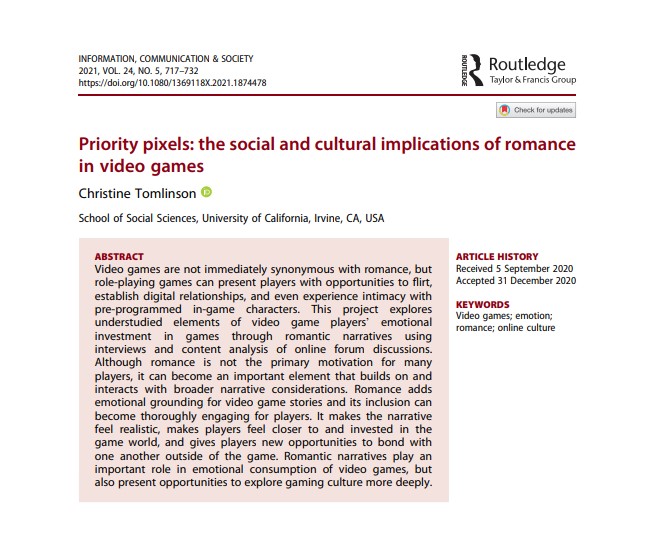
Video games are not immediately synonymous with romance, but role-playing games can present players with opportunities to flirt, establish digital relationships, and even experience intimacy with pre-programmed in-game characters. This project explores understudied elements of video game players’ emotional investment in games through romantic narratives using interviews and content analysis of online forum discussions. Although romance is not the primary motivation for many players, it can become an important element that builds on and interacts with broader narrative considerations. Romance adds emotional grounding for video game stories and its inclusion can become thoroughly engaging for players. It makes the narrative feel realistic, makes players feel closer to and invested in the game world, and gives players new opportunities to bond with one another outside of the game. Romantic narratives play an important role in emotional consumption of video games, but also present opportunities to explore gaming culture more deeply.
Read in Information, Communication & Society.
Sowing Seeds of Distrust: Video Game Player Perceptions of Companies in Online Forums
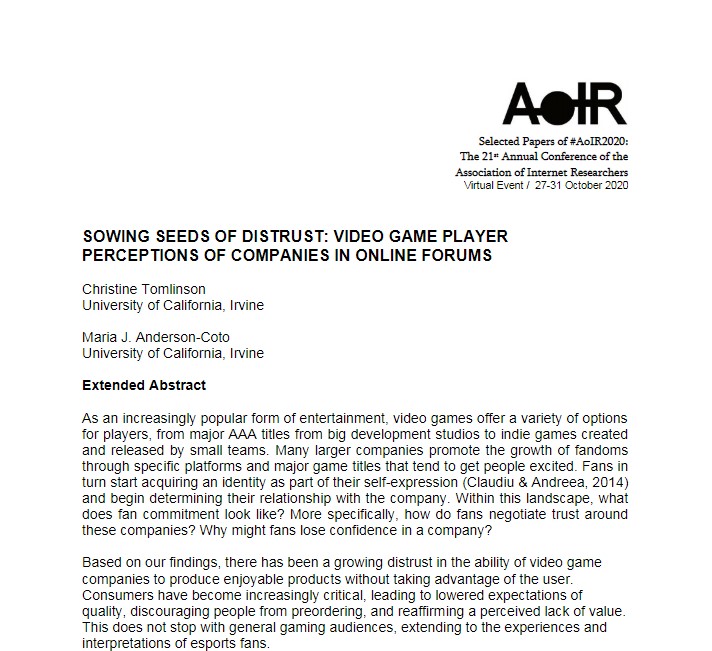
Authors: Christine Tomlinson and Maria J. Anderson-Coto
Video games have become a major source of entertainment across the globe. Along with this growth as a form of leisure, video game companies have recognized the importance of the communities and cultures that consumers build around their products. Fans establish identities linked to their gaming habits, whether they are playing games themselves or viewing games played by professionals. Fans also participate in communities, often facilitated through online forums. As part of this, fans discuss, express, and assess their relationship with the companies in charge of their hobbies. How do fans establish and negotiate trust with these companies and why might consumer trust to lapse? This project analyzes approximately 2,500 online forum posts from video game players and esports viewers to understand their perspectives on the companies involved in these spaces. Ultimately, the landscape appears to be developing increasing negativity where fans feel exploited and progressively concerned about company decisions. Fans have called into question the quality of video games and esports streams, motivations for specific decisions behind the scenes, and whether or not their actions as fans reward companies who are using them to meet a specific financial goal. A sense of common knowledge is developed that certain companies will make decisions at the perceived expense of the audience to increase profit. Although these sentiments are not present for all forum users, these discussions reveal increasing negative associations toward specific companies, games, and franchises.
Read on Association of Internet Researchers.
Player Definitions of Success, Skill, and Leadership in Video Games
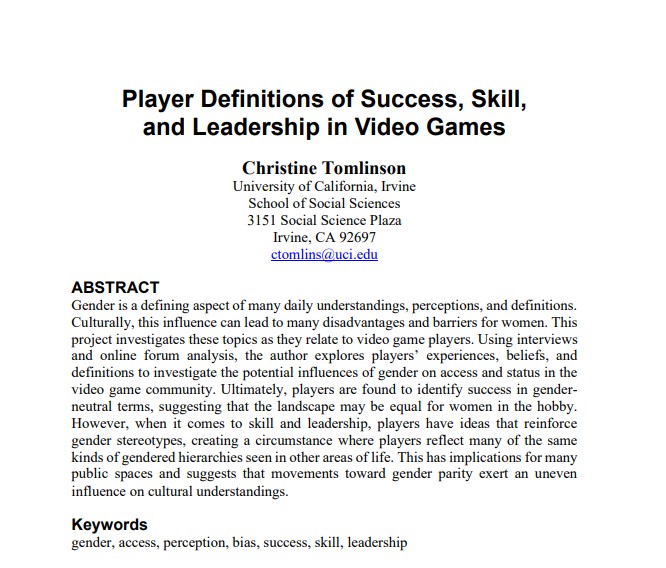
Gender is a defining aspect of many daily understandings, perceptions, and definitions. Culturally, this influence can lead to many disadvantages and barriers for women. This project investigates these topics as they relate to video game players. Using interviews and online forum analysis, the author explores players’ experiences, beliefs, and definitions to investigate the potential influences of gender on access and status in the video game community. Ultimately, players are found to identify success in genderneutral terms, suggesting that the landscape may be equal for women in the hobby. However, when it comes to skill and leadership, players have ideas that reinforce gender stereotypes, creating a circumstance where players reflect many of the same kinds of gendered hierarchies seen in other areas of life. This has implications for many public spaces and suggests that movements toward gender parity exert an uneven influence on cultural understandings.
Read on Digital Games Research Association.
The Influence of Gender on Stress Among Video Game Players
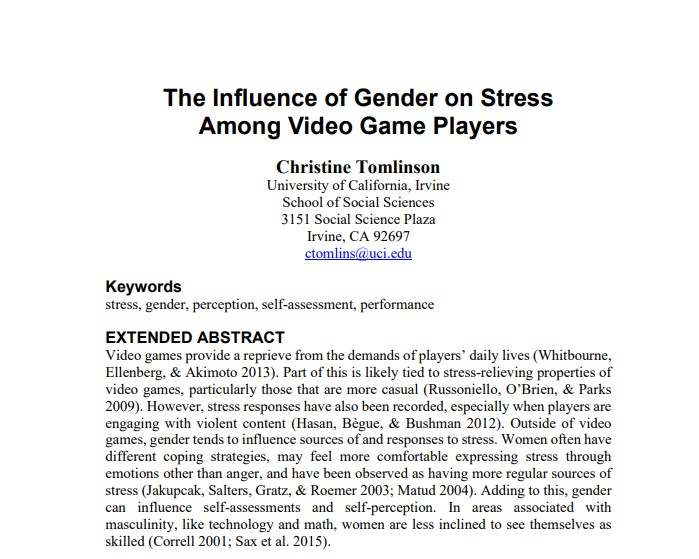
Video games provide a reprieve from the demands of players’ daily lives (Whitbourne, Ellenberg, & Akimoto 2013). Part of this is likely tied to stress-relieving properties of video games, particularly those that are more casual (Russoniello, O’Brien, & Parks 2009). However, stress responses have also been recorded, especially when players are engaging with violent content (Hasan, Bègue, & Bushman 2012). Outside of video games, gender tends to influence sources of and responses to stress. Women often have different coping strategies, may feel more comfortable expressing stress through emotions other than anger, and have been observed as having more regular sources of stress (Jakupcak, Salters, Gratz, & Roemer 2003; Matud 2004). Adding to this, gender can influence self-assessments and self-perception. In areas associated with masculinity, like technology and math, women are less inclined to see themselves as skilled (Correll 2001; Sax et al. 2015).
How, then, does gender influence potential stressors for video game players? To explore this question, this project uses interviews and online forum text analysis. The interview sample included just over 50 respondents, with just over half being women. The majority of the sample was from the United States and interviews were conducted via Skype or over the phone and took approximately one to two hours. The online forum data, totaling approximately 1,000 posts, was collected from five online forums, with two being general forums and three being aimed at women gamers. Gender is difficult to confirm in these cases but is based on user self-reporting in posts and comments. Data was collected from the most active conversations several times per week over the span of a month and from targeted searches for terms related to stress and frustration. Interviews and online conversations were coded for themes and patterns and analyzed for overlapping experiences and ideas.
Read on Digital Games Research Association.
Gaming on Romance
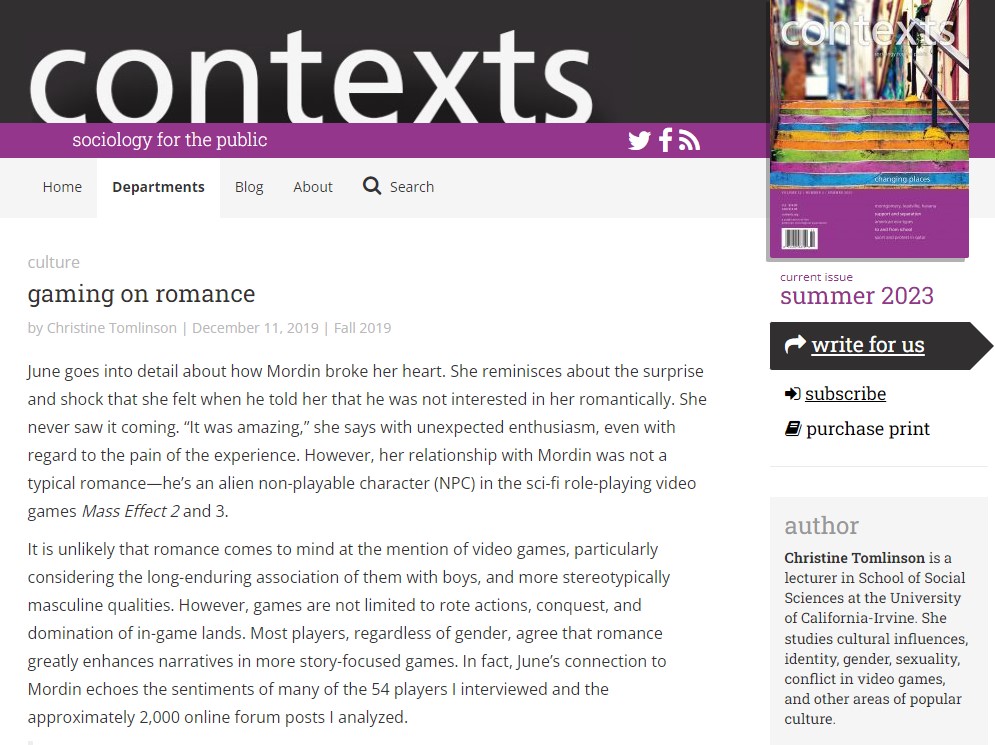
June goes into detail about how Mordin broke her heart. She reminisces about the surprise and shock that she felt when he told her that he was not interested in her romantically. She never saw it coming. “It was amazing,” she says with unexpected enthusiasm, even with regard to the pain of the experience. However, her relationship with Mordin was not a typical romance—he’s an alien non-playable character (NPC) in the sci-fi role-playing video games Mass Effect 2 and 3.
It is unlikely that romance comes to mind at the mention of video games, particularly considering the long-enduring association of them with boys, and more stereotypically masculine qualities. However, games are not limited to rote actions, conquest, and domination of in-game lands. Most players, regardless of gender, agree that romance greatly enhances narratives in more story-focused games. In fact, June’s connection to Mordin echoes the sentiments of many of the 54 players I interviewed and the approximately 2,000 online forum posts I analyzed.
Read in Contexts.
Building a Gamer: Player Preferences and Motivations Across Gender And Genre
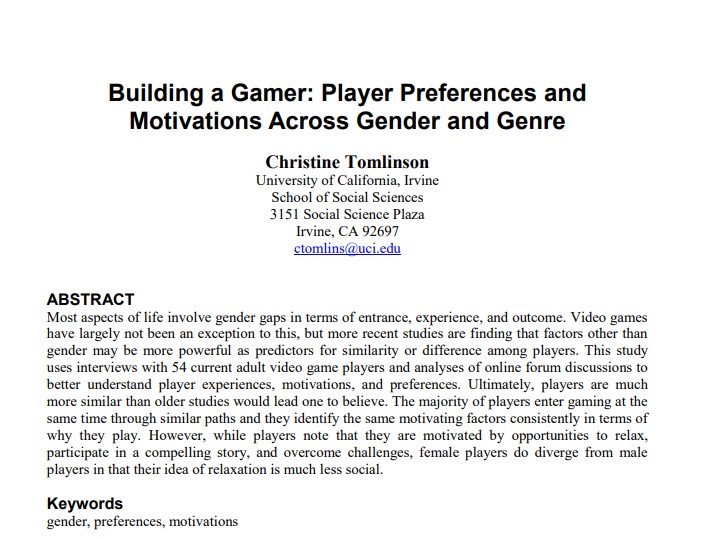
Most aspects of life involve gender gaps in terms of entrance, experience, and outcome. Video games have largely not been an exception to this, but more recent studies are finding that factors other than gender may be more powerful as predictors for similarity or difference among players. This study uses interviews with 54 current adult video game players and analyses of online forum discussions to better understand player experiences, motivations, and preferences. Ultimately, players are much more similar than older studies would lead one to believe. The majority of players enter gaming at the same time through similar paths and they identify the same motivating factors consistently in terms of why they play. However, while players note that they are motivated by opportunities to relax, participate in a compelling story, and overcome challenges, female players do diverge from male players in that their idea of relaxation is much less social.
Read on Digital Games Research Association.
Fandom Culture and Identity in Esports
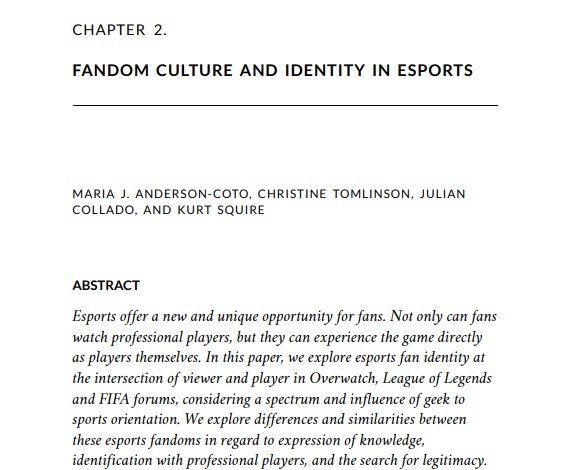
Authors: Maria J Anderson-Coto, Christine Tomlinson, Julian Collado, and Kurt Squire
Esports offer a new and unique opportunity for fans. Not only can fans watch professional players, but they can experience the game directly as players themselves. In this paper, we explore esports fan identity at the intersection of viewer and player in Overwatch, League of Legends and FIFA forums, considering a spectrum and influence of geek to sports orientation. We explore differences and similarities between these esports fandoms in regard to expression of knowledge, identification with professional players, and the search for legitimacy. These groups generally use knowledge and skill to demonstrate legitimacy, as a form of (sub) cultural capital. Fans display concerns about where they fit in regard to both traditional sports and other esports. However, whereas in traditional sports, outgroups are defined as membership in rival teams, in esports, outgroup status is conferred to casuals. Esports fandom is tribal in the sense that it is a method for fans to display tribal affiliation as “real” game players against the newer, lower level players.
Read in Proceedings of the 2019 Esports Research Conference.
Algorithmic Authenticity
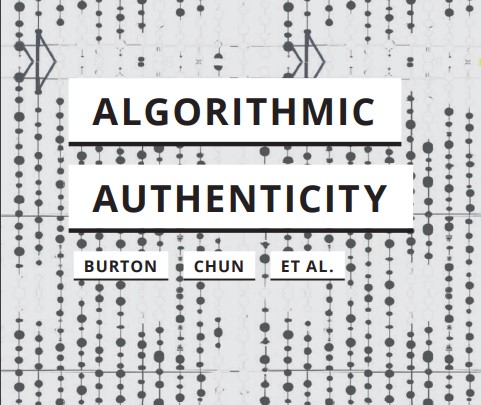
Authors: Anthony Glyn Burton, Wendy Hui Kyong Chun and
Liliana Bounegru, Melody Devries, Amy Harris,
hannah holtzclaw, Ioana Jucan, Alex Juhasz,
D. W. Kamish, Ganaele Langlois, Jasmine Proctor,
Christine Tomlinson, Roopa Vasudevan,
Esther Weltevrede
What makes information feel true or compelling in our contemporary digital societies? This book brings together different disciplinary understandings of “authenticity” in order to find alternative ways to approach mis- and disinformation that go beyond contemporary fact-checking and its search for the “authentic” truth.
Read from Meson Press.
Contributions and Book Chapters
Fictional Practices of Spirituality I
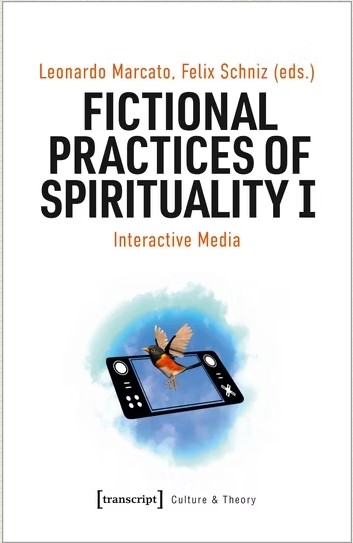
Editors: Leonardo Marcato and Felix Schniz
Chapter - Light, Blood, Stone, and Order: The Religious Beliefs and Systems of Dragon Age
This chapter extends theory on player capital, expanding the concept to include how players use in-game capital to influence in-game worlds. The chapter explores how players do this in the context of using in-game religion as a tool for worldbuilding and exploring agency in the Dragon Age video game series.
Read from Columbia University Press.
The Playtest Kit

By: Steve Bromley
Contribution - UX Screeners
This contribution covers how to develop surveys that will help you screen potential participants for your game tests.
Find at Games User Research.
Teaching the Game: Volume 1
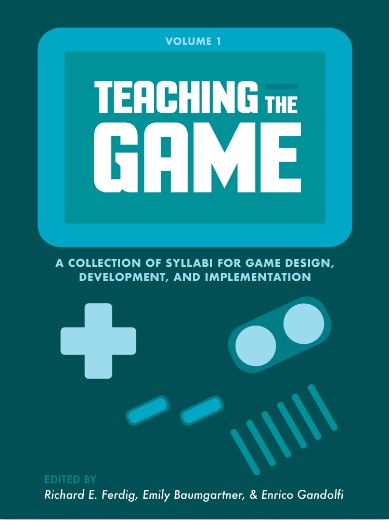
Editors: Richard E. Ferdig, Emily Baumgartner, and Enrico Gandolfi
Chapter - SocSci 189: Introduction to Video Gaming
This chapter covers one of my courses, Introduction to Video Gaming, and how I approach the class. It includes an overview of assignments, in-class activities, materials used in the course, and advice for developing a similar class.
Read from Carnegie Mellon University: ETC Press.













